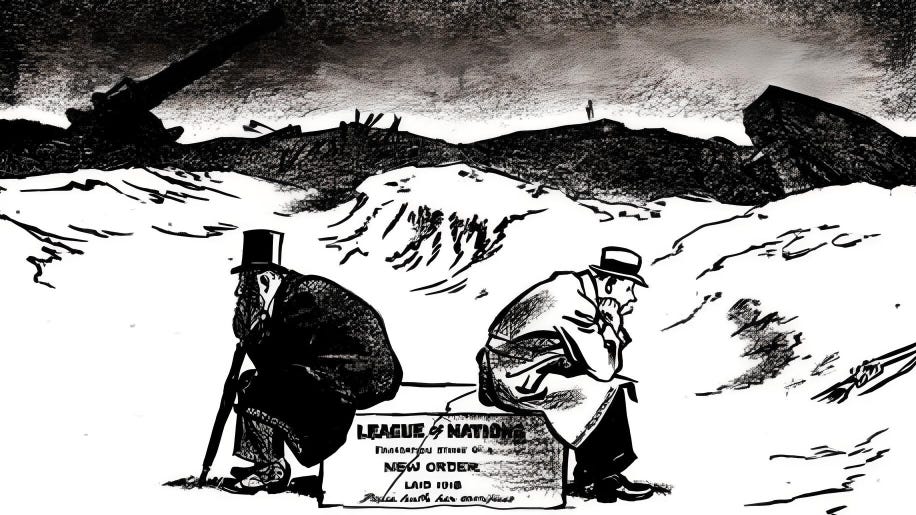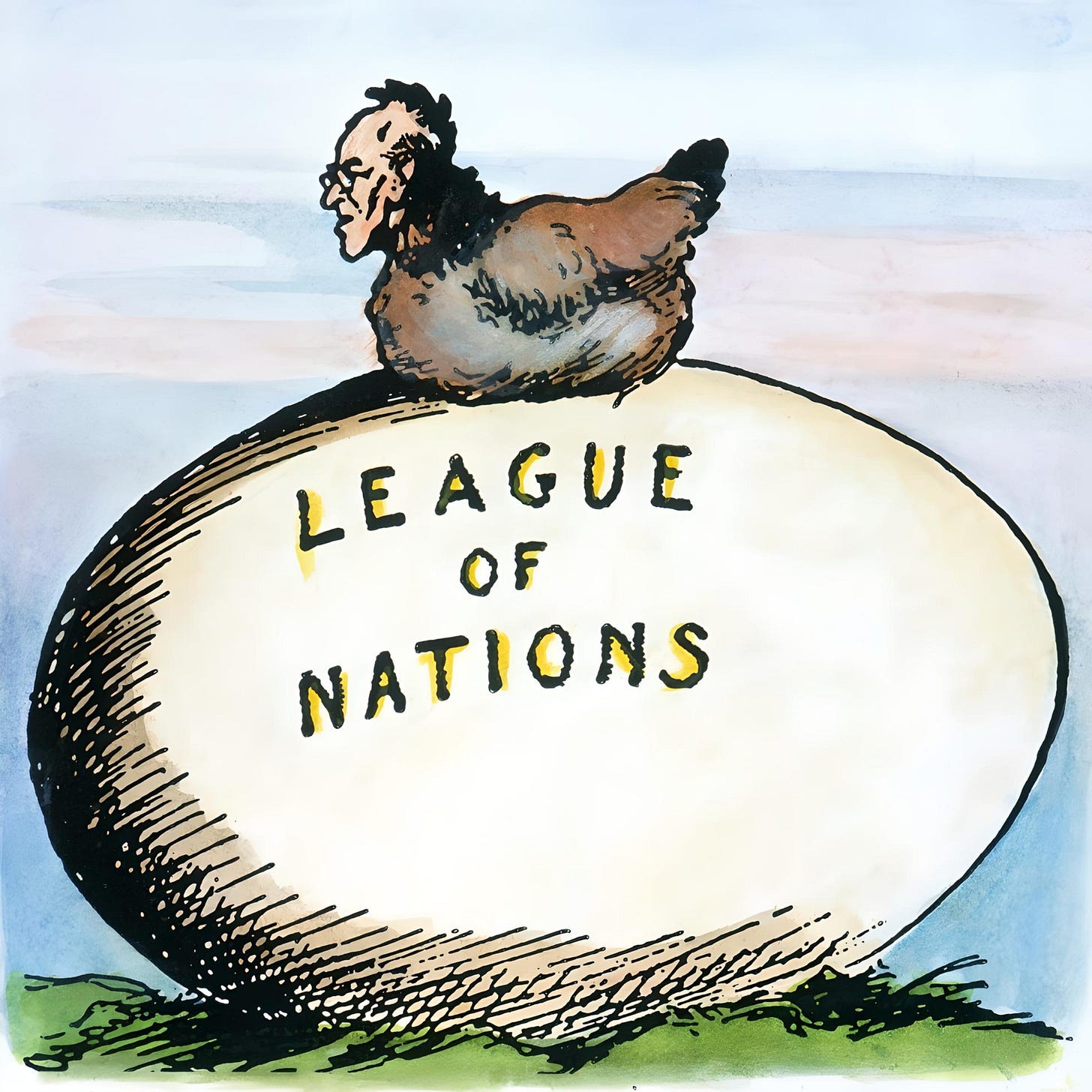The League
by H. P. Lovecraft
H. P. Lovecraft examines the optimistic illusions of post-war reconstruction and the idealistic but potentially flawed concept of a global “League of Nations,” as if plucked from a utopian novel rather than the harsh reality of geopolitical dynamics.
This is an excerpt from the Arktos edition of H. P. Lovecraft’s journal The Conservative. The article was first published in The Conservative Vol. 5, No. 1 (July 1919).
Endless is the credulity of the human mind. Having just passed through a period of indescribable devastation caused by the rapacity and treachery of an unwisely trusted nation which caught civilisation unarmed and unawares, the world purposes once more to adopt a policy of sweet trustfulness, and to place its faith again in those imposing ‘scraps of paper’ known as treaties and covenants; this time setting up as its bulwark against barbaric inroads a prettily and abstractly conceived ‘parliament of man and federation of the world’ popularly and semi-officially labelled as “The League of Nations.” It is to be a very nice and attractive League, we are told; brimful of safeguards against ordinary war, even though somewhat deficient in safeguards against Bolshevism. War, in fact, is to be formally and distinctly prohibited, or at least discouraged; which is of course an absolute guarantee of an immediate millennium of universal peace! Ultimately, as the grave proponents of the scheme condescend to inform us, all nations are to be included in this Utopian circle of friendship and confidence; thus giving us the valued collaboration of our highly honourable German, Turkish, and Bulgarian brothers in the momentous task of governing the future earthwide Elysium. Verily, it is a pleasing vision.
Men will submit to argument only up to a certain point, beyond which they invariably resort to force, however great the odds against them.
But visions generally become dangerous when mistaken for practical possibilities, and the present case is not likely to prove an exception. Since a war-weary and mentally fatigued world is really listening soberly to the vague theorising of league-advocates, it behooves us to awake to full consciousness and examine this roseate rhetoric in the white light of reason, history, and science. To sign any hastily drawn and clumsily patched league covenant without such an examination would be contrary to the traditions of a free and enlightened people.
Is it indeed true that man has suddenly discovered an infallible panacea for all political ills? Is it indeed certain that a general entanglement of diverse and in many case opposed countries offers a solution of all national difficulties? Have we indeed exchanged the natural laws of mankind and this earth for those of fairyland? To all these queries The Conservative is inclined to venture a negative reply.
Warfare, whose minimising is the avowed object of the proposed league, is something which can never be abolished altogether. As the natural expression of such inherent human instincts as hate, greed, and combativeness, it must always be reckoned with in some degree. Men will submit to argument only up to a certain point, beyond which they invariably resort to force, however great the odds against them. Would the league reduce warfare? On the contrary, it would probably have a precisely opposite effect. By multiplying international contacts, it would multiply international animosities; and upon each outbreak of trouble the indirectly involved powers would be less likely to act constitutionally as suppressors, than to divide according to sympathy and previous alignment, and to participate as combatants. Oaths and treaties are worth no more than the honour of those who make them. Set up one league, and it will soon be undermined by a score of clandestine inner leagues.
What we need as an international safeguard is not a cumbrous and futile federation of miscellaneous nations good and bad, with the independence of each one virtually destroyed; but a simple and practical alliance betwixt those powers such as the United States, Great Britain, France, and Italy, which inherit in common the highest ideals, and which possess almost no conflicting interests. Those who hold up our Federal Union as an example of a “League” in working order would do well to mark the fact that the component states are all of one general type, and not in any way comparable to the widely diverse nations of the globe. Such an alliance, properly armed, would constitute an almost resistless and stable force in world-politics; affording the best defence possible for our civilisation, and providing the best possible guarantee against needless wars.
Let us cease to think in unrealities, or to mouth such benevolent but empty catchwords as “disarmanent” and “universal brotherhood.” We are living not in Paradise but on Earth; and will fare best if we marshal the harmonious forces of civilisation in a sensible way for an attainable object, rather than rashly yoke together opposed and dissimilar cultures in the vain hope of realising a fantastic and impossible ideal.





Lovecraft of course makes several excellent points here which should really be obvious to anyone who looks into the concept of a United Nations-type of alliance for more than a couple of minutes.
I suppose it could be explained like this:
If a group of 10 guys are friends and they hang out regularly, but get to go home afterwards, they'll get along just fine... But if they all decide to rent a house together and are suddenly all wanting to use the kitchen, bathroom and living room at the same time and are sleeping in bunk beds in the same bedrooms, they'll start to step on each others toes, tensions will flare up, minor problems individuals may have had with one another will become exaggerated and serious conflicts will become a regular occurrence. Smaller factions will develop based on who agrees with whom, and before you know it a small war has broken out.
An overly-simple analogy, sure, but it's true.
Lovecraft was just as much of an articulate philosopher as he was a creative writer of horror. I love his arguments in this essay. I will present what arguments I detected in simple format below for those wanting to following.
P.S., Arktos journal, are you aware of anybody providing correspondence or a response to Lovecraft's article and if that was published?
Syllogism 1
P1: Warfare is a natural expression of inherent human instincts like hate, greed, and combativeness.
P2: Such instincts can never be fully abolished.
∴ Warfare can never be fully abolished.
Syllogism 2
P1: Treaties and alliances are only as trustworthy as the honor of those who make them.
P2: Nations do not always uphold treaties and alliances when it suits their interests.
∴ Placing full faith in treaties and alliances to maintain peace is naïve.
Syllogism 3
P1: The League of Nations aims to increase international contacts and cooperation.
P2: Increased contacts between nations will multiply opportunities for disagreements and animosities to emerge.
∴ The League will likely increase international tensions rather than reduce wars.
Syllogism 4
P1: If tensions rise between nations in the League, they will form clandestine alliances according to their sympathies.
P2: Such clandestine alliances will undermine unity within the League.
∴ The League will not prevent the rise of opposing factions and alliances between its members.
Syllogism 5
P1: When disagreements between nations become very strong, they will resort to force no matter the odds.
P2: The League has no means to enforce its prohibitions on war.
∴ The League cannot reliably stop wars from breaking out when national interests strongly clash.
Syllogism 6
P1: Increasing international contacts through the League will multiply opportunities for disagreements and animosities between nations.
P2: Such increased disagreements and animosities are likely to strengthen existing national interests clashes.
∴ The League will exacerbate rather than reduce geopolitical tensions capable of leading to war.
Syllogism 7
P1: Geopolitical realities like national interests, honor, and the will to use force cannot be abolished by international agreements.
P2: The League is based on an idealistic vision that overlooks these geopolitical realities.
∴ The League's aims are unrealistic and its means cannot achieve maintaining world peace in practice.